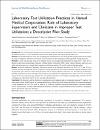Laboratory Test Utilization Practices in Hamad Medical Corporation; Role of Laboratory Supervisors and Clinicians in Improper Test Utilization; a Descriptive Pilot Study
Abstract
Background: The use of diagnostic laboratory tests is increasing worldwide. Improper test utilization (ITU) is a common problem for all healthcare systems as it costs substantial expenses for the health systems and impacts optimal patient care. Purpose: The present small-scale survey aims to highlight the current practice of ITU among the labs and physicians, and investigate the actions of diagnostic laboratories towards ITU, and identify the reasons affecting test ordering decisions among physicians. Methods: A cross sectional study based on two different surveys was developed and distributed from March 2017 to April 2017 to laboratory supervisors and physicians (clinicians) at Hamad Medical Corporation (HMC), Qatar. Fourteen laboratory supervisors and eighty-nine physicians were surveyed about improper test utilization practices. The overall results are descriptive data. Results: The overall proportion of improperly utilized tests detected by the laboratory supervisors were 50.0%, 35.7%, and 14.3% for overused, misused, and underused lab tests, respectively. Among the physicians, 91% used the electronic ordering template to select the appropriate tests. Moreover, 78.7% of the physicians used the clinical guidelines, while 73% were not employing the laboratory handbook. Furthermore, 95.5%% of the physicians preferred to get feedback about inappropriate tests, while 51.1% were not receiving any, and 40.9% were rarely receiving. Finally, 67.4% were unaware of the tests’ costs among surveyed physicians, and 63.6% showed a willingness to reduce their orders if the cost was high and unnecessary. Conclusion: The physician’s and the laboratories’ communication were inadequate and not systematized, causing ITU practices. The improvement strategy should focus on the communication between clinical labs and physicians and enhance physician implementation to order appropriate lab tests. This could be achieved by conducting legitimate educational methodologies, continuous feedback reviews, ongoing audits, executing health information technology instruments, engaging laboratory practice guidelines, and applying demand management and testing algorithms.
Collections
- Biomedical Sciences [789 items ]


